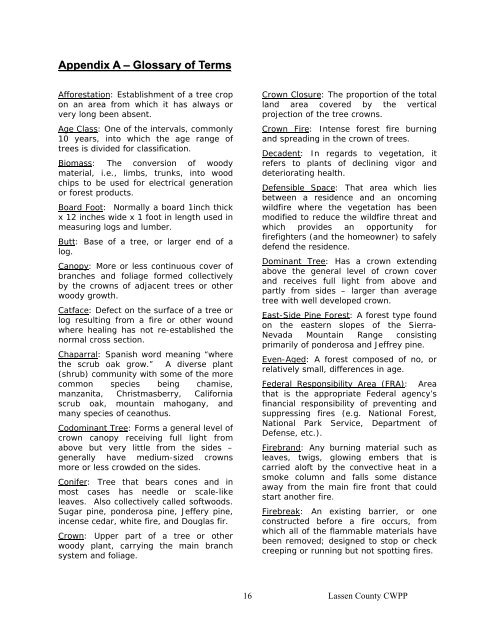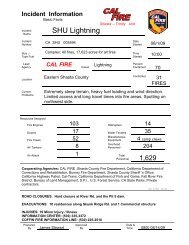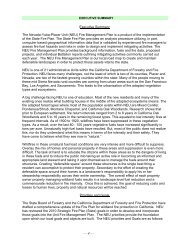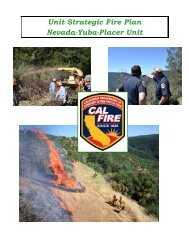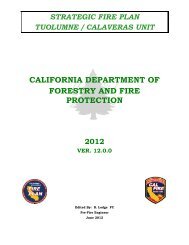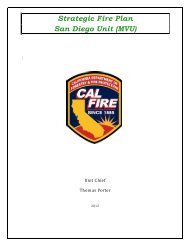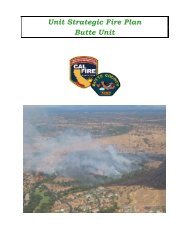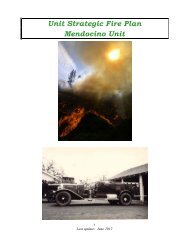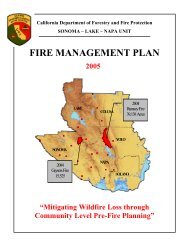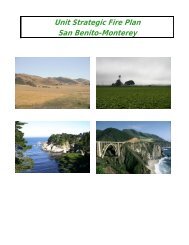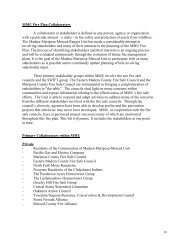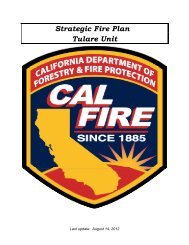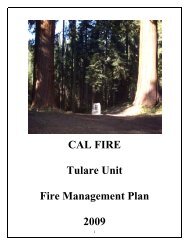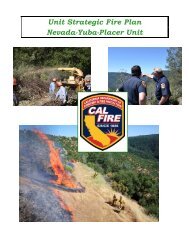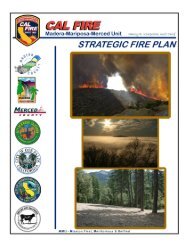Lassen – Modoc Unit - Board of Forestry and Fire Protection - State ...
Lassen – Modoc Unit - Board of Forestry and Fire Protection - State ...
Lassen – Modoc Unit - Board of Forestry and Fire Protection - State ...
You also want an ePaper? Increase the reach of your titles
YUMPU automatically turns print PDFs into web optimized ePapers that Google loves.
Appendix A <strong>–</strong> Glossary <strong>of</strong> Terms<br />
Afforestation: Establishment <strong>of</strong> a tree crop<br />
on an area from which it has always or<br />
very long been absent.<br />
Age Class: One <strong>of</strong> the intervals, commonly<br />
10 years, into which the age range <strong>of</strong><br />
trees is divided for classification.<br />
Biomass: The conversion <strong>of</strong> woody<br />
material, i.e., limbs, trunks, into wood<br />
chips to be used for electrical generation<br />
or forest products.<br />
<strong>Board</strong> Foot: Normally a board 1inch thick<br />
x 12 inches wide x 1 foot in length used in<br />
measuring logs <strong>and</strong> lumber.<br />
Butt: Base <strong>of</strong> a tree, or larger end <strong>of</strong> a<br />
log.<br />
Canopy: More or less continuous cover <strong>of</strong><br />
branches <strong>and</strong> foliage formed collectively<br />
by the crowns <strong>of</strong> adjacent trees or other<br />
woody growth.<br />
Catface: Defect on the surface <strong>of</strong> a tree or<br />
log resulting from a fire or other wound<br />
where healing has not re-established the<br />
normal cross section.<br />
Chaparral: Spanish word meaning “where<br />
the scrub oak grow.” A diverse plant<br />
(shrub) community with some <strong>of</strong> the more<br />
common species being chamise,<br />
manzanita, Christmasberry, California<br />
scrub oak, mountain mahogany, <strong>and</strong><br />
many species <strong>of</strong> ceanothus.<br />
Codominant Tree: Forms a general level <strong>of</strong><br />
crown canopy receiving full light from<br />
above but very little from the sides <strong>–</strong><br />
generally have medium-sized crowns<br />
more or less crowded on the sides.<br />
Conifer: Tree that bears cones <strong>and</strong> in<br />
most cases has needle or scale-like<br />
leaves. Also collectively called s<strong>of</strong>twoods.<br />
Sugar pine, ponderosa pine, Jeffery pine,<br />
incense cedar, white fire, <strong>and</strong> Douglas fir.<br />
Crown: Upper part <strong>of</strong> a tree or other<br />
woody plant, carrying the main branch<br />
system <strong>and</strong> foliage.<br />
16<br />
Crown Closure: The proportion <strong>of</strong> the total<br />
l<strong>and</strong> area covered by the vertical<br />
projection <strong>of</strong> the tree crowns.<br />
Crown <strong>Fire</strong>: Intense forest fire burning<br />
<strong>and</strong> spreading in the crown <strong>of</strong> trees.<br />
Decadent: In regards to vegetation, it<br />
refers to plants <strong>of</strong> declining vigor <strong>and</strong><br />
deteriorating health.<br />
Defensible Space: That area which lies<br />
between a residence <strong>and</strong> an oncoming<br />
wildfire where the vegetation has been<br />
modified to reduce the wildfire threat <strong>and</strong><br />
which provides an opportunity for<br />
firefighters (<strong>and</strong> the homeowner) to safely<br />
defend the residence.<br />
Dominant Tree: Has a crown extending<br />
above the general level <strong>of</strong> crown cover<br />
<strong>and</strong> receives full light from above <strong>and</strong><br />
partly from sides <strong>–</strong> larger than average<br />
tree with well developed crown.<br />
East-Side Pine Forest: A forest type found<br />
on the eastern slopes <strong>of</strong> the Sierra-<br />
Nevada Mountain Range consisting<br />
primarily <strong>of</strong> ponderosa <strong>and</strong> Jeffrey pine.<br />
Even-Aged: A forest composed <strong>of</strong> no, or<br />
relatively small, differences in age.<br />
Federal Responsibility Area (FRA): Area<br />
that is the appropriate Federal agency’s<br />
financial responsibility <strong>of</strong> preventing <strong>and</strong><br />
suppressing fires (e.g. National Forest,<br />
National Park Service, Department <strong>of</strong><br />
Defense, etc.).<br />
<strong>Fire</strong>br<strong>and</strong>: Any burning material such as<br />
leaves, twigs, glowing embers that is<br />
carried al<strong>of</strong>t by the convective heat in a<br />
smoke column <strong>and</strong> falls some distance<br />
away from the main fire front that could<br />
start another fire.<br />
<strong>Fire</strong>break: An existing barrier, or one<br />
constructed before a fire occurs, from<br />
which all <strong>of</strong> the flammable materials have<br />
been removed; designed to stop or check<br />
creeping or running but not spotting fires.<br />
<strong>Lassen</strong> County CWPP


